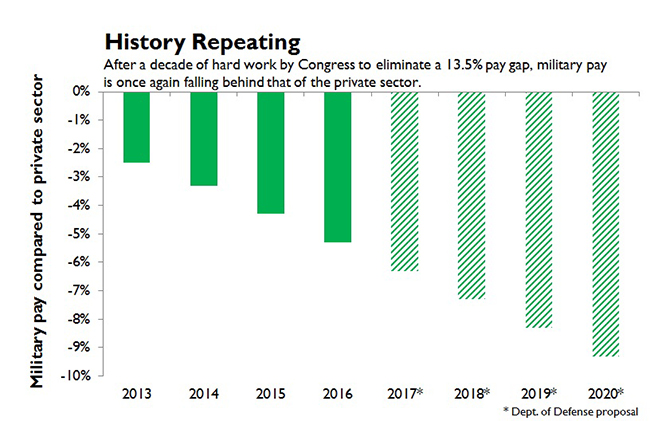September 4, 2015
President Obama sent a disappointing letter to Congressional leaders last week stating that he plans to use his executive authority to cap military pay for the third consecutive year.
In 2014 and 2015, pay raises were capped at 1 percent. The president intends to cap 2016 pay raises at 1.3 percent, instead of the 2.3 percent raise called for by law.
The troops’ last four raises averaged less than 1.4 percent, with the FY14 and FY15 pay raises being the lowest in 50 years.
In his letter, Obama said that he is, “strongly committed to supporting our uniformed service members, who have made such great contributions to our Nation over the past decade of war.” However, he insisted that this move is necessary to, “maintain efforts to keep our Nation on a sustainable fiscal course.”
DoD leadership came out in support of the president’s announcement, insisting that the pay cap is needed to support modernization and training.
Several years of capping pay below private sector wage growth took place during the 1980’s and 90’s, until servicemembers faced a 13.5 percent pay gap. Because recruitment and retention ultimately suffered, Congress spent a decade trying to fix the issue by providing pay raises above the Employment Cost Index (ECI). After coming within 2.5 percent of pay parity in 2013, DoD and Congress considered the issue resolved.
Now it looks like all of the hard work Congress did is unwinding. A third year of pay caps expands the difference between pay in the military and private sector to 5 percent. And with four more years of DoD-proposed caps, it will get much worse.

Three years of pay caps really add up. An E-5 with ten years of service will receive about $976 less annually. For an O-3 with 10 years, it will be about $1,870.
“Although Congress and the administration are under pressure from budget restrictions, this is incredibly disappointing,” said MOAA Director of Government Relations, Col Mike Hayden, USAF (Ret). “Past experience with capping military raises below private sector pay growth has shown that once pay raise caps begin, they continue until they undermine retention and readiness of the all-volunteer force.”
Military pay comparability only works when it’s sustained through both good and bad budget times.